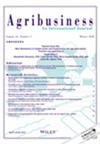Are agrochemical‐free and biodiversity‐friendly attributes substitutes or complements? Evidence from a coffee choice experiment
IF 2
3区 经济学
Q2 AGRICULTURAL ECONOMICS & POLICY
引用次数: 0
Abstract
Eco‐labels inform consumers about the sustainable attributes of a product, but consumer face challenges to differentiate and select for specific attributes. Certification programs are similarly challenged to incentivize adoption of sustainable practices in product supply chains when consumer ability to differentiate sustainable attributes is low. This study investigates consumers' Willingness to Pay (WTP) for different environmental attributes of coffee production, and whether attributes that conserve biodiversity and limit agrochemical usage are substitutes or complements. We designed and implemented a hypothetical coffee choice experiment combining coffee farm vegetation management attributes that impact biodiversity (conventional monoculture, shade‐grown, or “Bird Friendly” systems that conserve wildlife habitat) and chemical input (conventional, pesticide‐free, or organic) attributes. We found that consumers think of biodiversity and agrochemical management attributes as sustainability substitutes and have the highest WTP for pesticide‐free and organic attributes. Consumer groups with strong concern about the future of the environment had high WTP for all environmental attributes, but still considered the attributes to be substitutes. Our results suggest that eco‐label programs with biodiversity and agrochemical attributes, such as the Smithsonian Bird Friendly® coffee certification, could increase market participation by simplifying environmental sustainability messaging, simplifying farm‐level certification requirements, and targeting environmentally concerned consumers. [EconLit Citations: D12, Q01, Q13, L66].无农用化学品和生物多样性友好属性是替代品还是互补品?来自咖啡选择实验的证据
生态标签让消费者了解产品的可持续属性,但消费者在区分和选择特定属性方面面临挑战。同样,当消费者区分可持续属性的能力较低时,认证计划在激励产品供应链采用可持续实践方面也面临挑战。本研究调查了消费者对咖啡生产的不同环境属性的支付意愿(WTP),以及保护生物多样性和限制农用化学品使用的属性是替代品还是互补品。我们设计并实施了一个假设的咖啡选择实验,将影响生物多样性的咖啡农场植被管理属性(传统单一种植、遮荫种植或保护野生动物栖息地的 "爱鸟 "系统)和化学投入属性(传统、无农药或有机)结合起来。我们发现,消费者认为生物多样性和农用化学品管理属性是可持续性的替代品,对无农药和有机属性的购买意愿最高。强烈关注环境未来的消费者群体对所有环境属性的 WTP 都很高,但仍认为这些属性是替代品。我们的研究结果表明,具有生物多样性和农用化学品属性的生态标签计划(如史密森尼爱鸟®咖啡认证)可以通过简化环境可持续性信息、简化农场级认证要求以及锁定关注环境的消费者来提高市场参与度。[经济学引文:D12、Q01、Q13、L66]。
本文章由计算机程序翻译,如有差异,请以英文原文为准。
求助全文
约1分钟内获得全文
求助全文
来源期刊

Agribusiness
农林科学-食品科技
CiteScore
5.50
自引率
6.20%
发文量
58
审稿时长
6 months
期刊介绍:
Agribusiness: An International Journal publishes research that improves our understanding of how food systems work, how they are evolving, and how public and/or private actions affect the performance of the global agro-industrial complex. The journal focuses on the application of economic analysis to the organization and performance of firms and markets in industrial food systems. Subject matter areas include supply and demand analysis, industrial organization analysis, price and trade analysis, marketing, finance, and public policy analysis. International, cross-country comparative, and within-country studies are welcome. To facilitate research the journal’s Forum section, on an intermittent basis, offers commentary and reports on business policy issues.
 求助内容:
求助内容: 应助结果提醒方式:
应助结果提醒方式:


